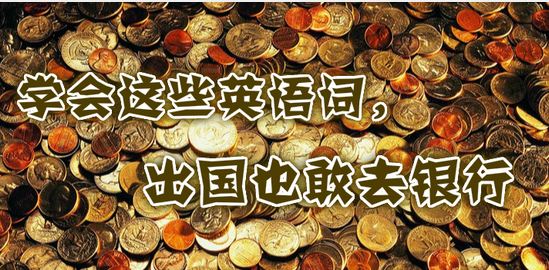Xiaohua: Hello! And welcome to round table's word of the week. This week we are talking about some banking related terms. Cause you know everyone needs the bank, but not everyone knows some of the terms are you use we you go to one.
John: Yeah. It is true. If only we didn't all need to use the bank, but as Xiaohua said we'll be looking at, if you're going abroad, and in particular if you're going to the US and you have to deposit a check or maybe make a withdrawal, well, you wanna take a listen real quick. So first of all, if you go to a bank and you want to get money out of your account, you would go up to the teller, so it's the person who is working behind the desk and say, “I would like to make a withdrawal.”
Xiaohua: 當(dāng)去銀行要提款的時(shí)候就要說(shuō)這句話了,另外teller就是銀行的柜員。

John: Then the teller might ask you how would you like the money. That basically means what types of notes and how many notes do you want for that withdrawal.
Xiaohua: How would you like the money 可不是說(shuō)你想要什么樣的錢(qián),而是說(shuō)你想要什么面值的鈔票。
John: Right. It's not do you want that in RMB or do you want that in US dollars. No. Do you want that in tens, fives or twenties, fifties (Xiaohua: Exactly.) or in one hundreds? But don't ask for one hundreds, because very few stores actually accept that. And then looking at if you want to put money in, you can say I would like to make a deposit, so you are depositing money. You can also say, for example, maybe you have your check from work. And you can say to the teller I would like to deposit this check.
Xiaohua: 需要存錢(qián)的話就說(shuō)make a deposit。另外check支票也是在英美國(guó)家經(jīng)常用的,所以你有可能想要把某一張支票存入帳戶(hù)。這時(shí)候就說(shuō)deposit this check.
John: Yeah. Deposit this check. You can say, I'd like to, you know, you can deposit cash. You can deposit a check or whatever form of payment you have. Let's say that you've never been to that bank before. And you want to open a bank account. Well, that's very simple. You just say I would like to open a bank account.
Xiaohua: 在銀行開(kāi)戶(hù)就是open a bank account.
John: And you know, of course, life is not as simple or as easy as we would like it to be. Sometimes maybe you'll lose your ATM card or you'll lose your credit card. So you can call their service number or you can go to the bank and you can report a lost credit card or a stolen credit card.
Xiaohua: 如果丟了銀行卡或者是信用卡要掛失的時(shí)候就要說(shuō)report a lost credit card or a stolen credit card.
John: And here's a pretty important difference. In banks there are many different types of accounts, as I'm sure you are already aware. But we are gonna look at some of the more broader categories. So in general, there are two types of accounts. One is a checking account and the other is a savings account. A checking account is an account that has very very low interest that you are making payments into and making withdrawals on a regular basis. Whereas the savings account has a slightly higher interest rate, and it is expected that there will not be very much activity on that account.
Xiaohua: 下面來(lái)介紹一下經(jīng)常會(huì)用到的幾種帳戶(hù)的名字。 Checking account 是支票帳戶(hù)又是活期帳戶(hù)的意思。而savings account指的是儲(chǔ)蓄帳戶(hù)或者是有一定利息的定期存款賬戶(hù)。
John: Now let's move away from these dry and slightly boring words and phrases and take a look at some bank related idioms. First, on the books is “break the bank”. Buying a new pair of shoes at a discount price won't break the bank.
Xiaohua: 下面我們來(lái)看一下一些跟銀行有關(guān)的習(xí)語(yǔ)吧。Break the bank 可不是什么搶劫銀行的意思,而是說(shuō)你的錢(qián)都花光了。
John: Right. And then “bank on something”. Man I am so reliable, of course you can bank on me.
Xiaohua: Bank on something是信賴(lài)某事,信賴(lài)某人。
John: Then of course “you can take that to the bank” or take it to the bank. Our US president Barack Obama is very famous for saying that in one of his election campaign speeches, making a promise and he says you can take that to the bank. And of course, what I am telling you is the truth. You can take it to the bank.
Xiaohua: Take it to the bank 是說(shuō)我打包票我說(shuō)的都是真的,你可以去求證的意思。據(jù)說(shuō)奧巴馬也非常喜歡用這個(gè)詞。 And that's all we have for this week's word of the week.
John: Bye Bye.











